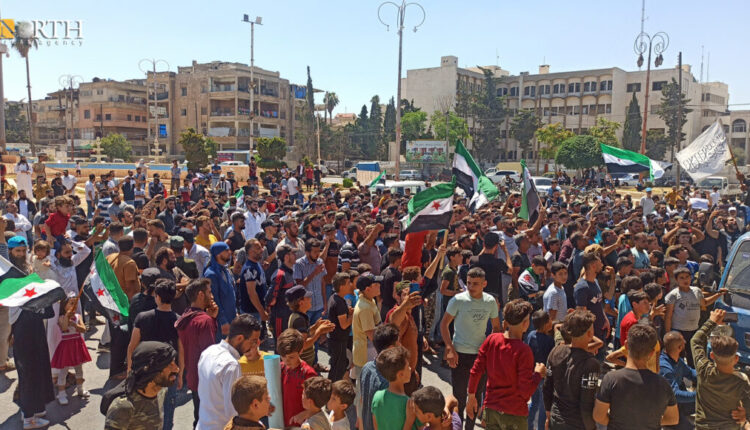
ERBIL, KRI, Iraq (North Press) – Activists and people in northwest Syria rejected the recent rapprochement between Syrian government and Turkey, emphasizing that Ankara “seeks to attain its interests at the expense of the Syrian people.”
On August 11, a demonstration took place in the city of Azaz to denounce the statements made by Turkey’s Minister of Foreign Affairs, Mevlut Cavusoglu, in which he called for reconciliation between the Syrian government and opposition.
During the demonstration, protesters removed the Turkish flags from the squares and streets of Azaz and burned some of them.
However, differing views were shown by the opposition as some averted to comment or tried to alleviate the popular agitation while others emphasized their rejection to reconcile with the “regime” calling for its overthrow.
Adnan al-Homsi, 38, an Idlib-based Syrian activist, told North Press that the recent rapprochement between Turkey and “al-Assad regime” is merely to attain Turkey’s interest at the expense of sacrifices made by Syrians.”
“In the course of recent years, Turkey used to claim that it is a friend to the Syrian people, however, the actual reality says it was preparing to sacrifice this people to meet in guaranteeing its national security and to destroy the SDF [Syrian Democratic Forces],” al-Homsi added.
He indicated that Turkey was indifferent to the Syrian people’s revolution against “the regime” in the course of the last ten years.
“The Turkish position is a clear betrayal to the Syrians and to the sacrifices made,” he noted, laying stress on his rejection to “any reconciliation with the al-Assad regime.”
“We cannot reconcile with the one who has been behind murder, displacement and detention. Turkey ought to withdraw its custodianship over the Syrian people and its support to the factions that direct under its orders,” he said.
Iyad al-Qassem, 36, an Idlib-based internally displaced person (IDP) from south of the city of Hama attributes the recent rapprochement between the “Syrian regime” and Turkey to the agitation in Turkey towards Syrian refugees and their exploitation by the Turkish opposition against the ruling party.”
Al-Qassem added that the statement made by Mevlut Cavusoglu was “a step forward to withdraw such a pressure from the Turkish opposition that have always put pressure on the government regarding the way to deal with the Syrian refugees.”

He noted to another factor relevant to the Russian pressure on Turkey to support “al-Assad regime.”
In this context, Abdurrahman al-Omar, 29, a university student, said “Turkey, pushed by Russia, is determined to revive its relations with the regime, in line with Turkey’s mere priorities and balances.”
“It is possible that this may take time, however, it is going to happen after a while,” according to al-Omar.
“Though Turkey has always behaved in line with its strategies that only attain its interests which may run in line with Syrians’, however, its position was surprising.”
“The mechanism by which such a reconciliation is going to go ahead is still unclear for Syrians,” al-Omar added, expressing his belief that ”the so-called reconciliation includes certain areas and it does not mean any reconciliation proper. They may agree on a formulation to a settlement among the guarantor states apart from any Syrian part, as it has always been the case.”
Samer al-Halabi, a pseudonym for a journalist from Idlib, said the recent Turkish statements affirm the theory that “There are no permanent friends or enemies in politics,” every state seeks to attain its interest and that of its people.
The Syrian journalist said he was not surprised at the Turkish transition, “notably it seeks to play a prominent godfather in the region, and to assume the same role in Ukraine by having good relations with both parties of the conflict.”
Al-Halabi ruled out that such a Turkish policy could meet success in the Syrian affair.
Al-Halabi expressed his wholesale rejection of the reconciliation, noting “Syrians gave up a lot of basic needs of life in the last years just to keep their main principles that cannot be surpassed, most importantly approaching the regime that killed and displaced millions of Syrians in the course of the last eleven years.”
